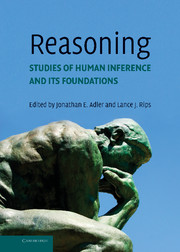52 - Distinct Brain Loci in Deductive versus Probabilistic Reasoning
Published online by Cambridge University Press: 05 June 2012
Summary
Introduction
Normative theories of reasoning distinguish two kinds of persuasive arguments depending on the inferential connection between premises and conclusion. If the truth of an argument's premises guarantee that of its conclusion, the argument is called valid, whereas if the premises merely enhance the plausibility of the conclusion, the argument is probabilistically strong. Human intuition about validity and probability is limited to inferences of moderate size and reveals systematic imperfections even when applied to simple cases. Nonetheless, starting from adolescence both forms of reasoning are recognizable approximations to their normative counterparts [3, 6, 11].
What is the psychological relation between deductive and probabilistic reasoning? One influential theory conceives both kinds of reasoning as involving the manipulation of ‘mental models’. In this view, an argument is evaluated by constructing alternative models of its premises, where each model is a representation of potential circumstances that would render the premises true. The argument is then judged to be probabilistically strong in case a large proportion of the models generated for the premises render the conclusion true as well; the intuition of validity arises from the limiting case in which this proportion reaches one. Within epistemology, such an account of the relation between validity and probability was proposed by Wittgenstein [[41], §5.15], and followed up by de Finetti [9] and others. A psychological version of the same idea has recently been proposed by Johnson-Laird [23], where it receives detailed and persuasive defense.
Information
- Type
- Chapter
- Information
- ReasoningStudies of Human Inference and its Foundations, pp. 1016 - 1023Publisher: Cambridge University PressPrint publication year: 2008
